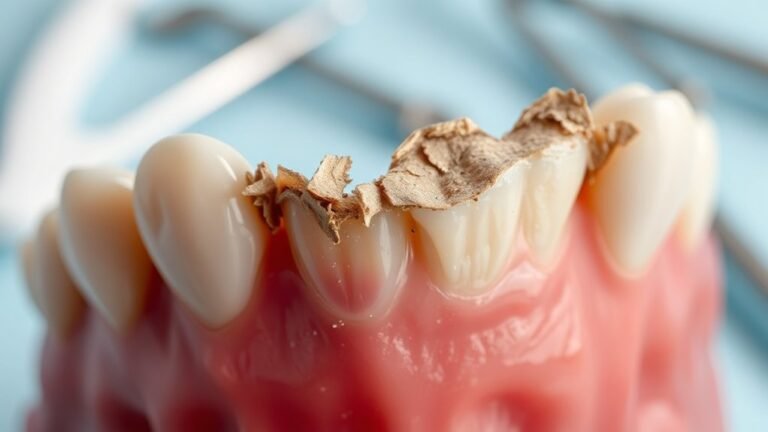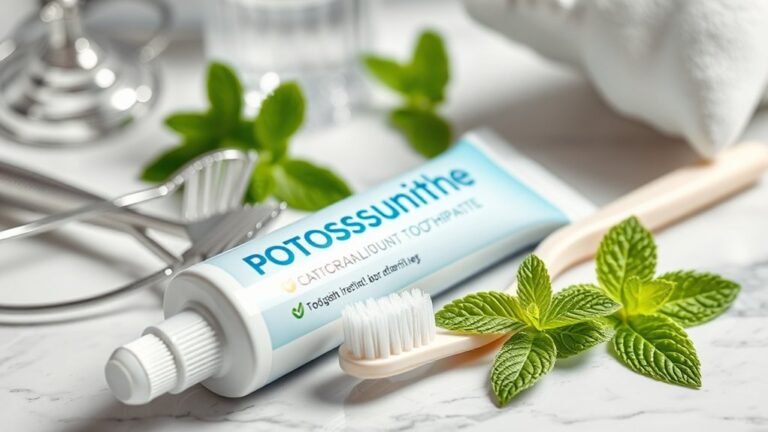Can Dietary Vitamins and Minerals Strengthen Tooth Enamel Effectively
Dietary vitamins and minerals can effectively strengthen your tooth enamel. Vitamins A, C, and D, along with minerals like calcium, phosphorus, and magnesium, all play crucial roles in enhancing enamel integrity and promoting remineralization. Foods rich in these nutrients, such as dairy, leafy greens, and fruits, are essential for maintaining strong enamel. As you focus on a balanced diet, you’ll uncover more tips to support your dental health and enhance the strength of your enamel.
Key Takeaways
- Dietary vitamins and minerals, such as calcium and phosphorus, are essential for strengthening tooth enamel and preventing decay.
- Vitamin D enhances calcium absorption, supporting enamel health and integrity.
- Vitamin A and C promote saliva production and gum health, vital for enamel remineralization.
- Antioxidants from foods like berries and green tea help reduce inflammation and support overall oral health.
- A balanced diet rich in these nutrients is crucial for maintaining strong enamel and preventing dental issues.
The Importance of Tooth Enamel
Tooth enamel plays an important role in your oral health, as it serves as the protective outer layer of your teeth. This mineralized substance is essential for maintaining tooth enamel strength, which helps shield your teeth from decay, sensitivity, and wear. When enamel is compromised, it can lead to significant dental issues, including cavities and erosion. To keep your enamel strong, focus on a balanced diet rich in calcium and phosphorus, which are necessary for remineralization. Additionally, limit sugary and acidic foods that can erode enamel over time. Regular dental check-ups and good oral hygiene practices, like brushing and flossing, are also important in preserving your enamel and, consequently, your overall oral health. Prioritize your enamel for a healthier smile!
Key Vitamins for Dental Health
To maintain strong dental health, it’s essential to understand the key vitamins and minerals that support tooth enamel. These nutrients play a crucial role in protecting your teeth and can be found in various foods. By incorporating the right sources into your diet, you can enhance your oral health effectively.
Essential Vitamins Overview
Maintaining strong and healthy tooth enamel relies heavily on a variety of essential vitamins. These dietary vitamins play important roles in supporting your dental health, particularly in enhancing enamel strength and preventing decay. Here’s a quick overview of key vitamins:
| Vitamin | Benefits |
|---|---|
| Vitamin A | Promotes saliva production, aiding in remineralization. |
| Vitamin C | Supports gum health and collagen formation, important for enamel integrity. |
| Vitamin D | Enhances calcium absorption, essential for strong enamel. |
Incorporating these vitamins into your diet can greatly benefit your enamel and overall dental health. Don’t underestimate the power of nutrition; a balanced diet rich in these vitamins can help you maintain that beautiful smile!
Mineral Importance Explained
Minerals play a crucial role in dental health, particularly for strengthening tooth enamel and preventing decay. Key minerals like calcium, phosphorus, and magnesium are essential for maintaining strong teeth. Calcium is crucial for the structure of your enamel, while phosphorus helps in remineralization, repairing any damage that may occur. Magnesium supports calcium absorption, ensuring that your body effectively utilizes these minerals. A balanced diet rich in these nutrients promotes healthy teeth and gums. When you prioritize your nutrition, you’re not just supporting overall health; you’re actively safeguarding your smile. Remember, incorporating these essential minerals into your daily routine can make a significant difference in your dental health, helping you maintain a strong and resilient enamel.
Food Sources to Consider
While you might focus on minerals for your dental health, don’t overlook the importance of key vitamins that also play an essential role in maintaining strong tooth enamel. Vitamin D is vital, as it aids in mineral absorption, helping your body utilize calcium and phosphorus effectively. Foods rich in vitamin D include fatty fish, egg yolks, and fortified dairy products. Additionally, vitamin C contributes to gum health and supports the overall structure of your teeth. You can find vitamin C in citrus fruits, strawberries, and bell peppers. Incorporating these vitamins into your diet not only strengthens your tooth enamel but also enhances your overall dental well-being. Aim for a balanced diet to guarantee you’re getting all the nutrients necessary for ideal dental health.
Essential Minerals for Strong Enamel
To maintain strong tooth enamel, it’s vital to focus on essential minerals like calcium and phosphorus. Calcium strengthens enamel and helps prevent decay, while phosphorus works alongside it to enhance mineralization. Ensuring you get adequate amounts of both minerals can greatly improve your dental health.
Calcium’s Role in Enamel
Calcium plays an essential role in maintaining strong tooth enamel, acting as the primary mineral that forms this protective outer layer. It’s vital for tooth protection, as it helps to remineralize enamel and repair damage caused by acids from food and bacteria. When you consume calcium-rich foods like dairy products, leafy greens, and fortified cereals, you’re providing your teeth with the necessary nutrients to stay strong. Adequate calcium intake not only supports enamel health but also promotes overall oral health by keeping your jawbone robust. If you’re concerned about your enamel, consider incorporating more calcium into your diet. Remember, strong enamel is your first line of defense against cavities and decay, so prioritize calcium for lasting tooth protection.
Importance of Phosphorus
Phosphorus is essential for strong tooth enamel, as it works synergistically with calcium to enhance mineralization and strengthen the enamel structure. This mineral plays a significant role in dental care, ensuring that your teeth remain resilient against decay. Phosphorus helps to form hydroxyapatite, the main mineral component of enamel, which is critical for maintaining its hardness and integrity. You can find phosphorus in foods like dairy products, meats, nuts, and whole grains. To boost your enamel strength, it’s important to maintain a balanced diet rich in both phosphorus and calcium. By doing so, you’ll not only support your enamel but also promote overall dental health, making your smile brighter and more durable against everyday wear and tear.
The Role of Calcium in Enamel Strength
While many factors contribute to the strength of tooth enamel, calcium stands out as a fundamental mineral essential for its formation and maintenance. This important nutrient plays a key role in enamel remineralization, helping to restore lost minerals and reinforce your teeth against decay. When you consume calcium-rich foods, like dairy products and leafy greens, you provide your body with the resources needed to support enamel integrity. Adequate calcium intake not only strengthens your enamel but also aids in preventing dental issues, such as cavities and sensitivity. Remember, maintaining a balanced diet that includes sufficient calcium can greatly enhance your oral health, ensuring your enamel remains strong and resilient against everyday wear and tear.
Vitamin D: The Enamel Enhancer
Tooth enamel health relies not only on minerals like calcium but also on vitamins that support its structure and function. Vitamin D plays an essential role in enhancing enamel strength by improving calcium absorption in your body. When you maintain adequate vitamin D levels, you’re not just protecting your teeth from tooth decay; you’re also promoting overall oral health.
| Benefit of Vitamin D | Effect on Tooth Enamel | Source of Vitamin D |
|---|---|---|
| Enhances calcium absorption | Strengthens enamel structure | Sunlight |
| Reduces inflammation | Prevents gum disease | Fatty fish (salmon) |
| Supports immune function | Lowers risk of cavities | Fortified dairy products |
Incorporating vitamin D into your diet can greatly enhance your tooth enamel, making it an essential nutrient for dental care.
Phosphorus and Its Impact on Teeth
One of the essential minerals for maintaining strong teeth is phosphorus, which plays a crucial role in the formation and maintenance of tooth enamel. This mineral combines with calcium to help create hydroxyapatite, the primary component of your enamel. By ensuring you get enough phosphorus in your diet, you’re supporting your enamel’s strength and resilience against decay. Foods rich in phosphorus include dairy products, meat, fish, and nuts, making it relatively easy to incorporate into your meals. However, remember that maintaining good oral hygiene is equally important; brushing and flossing help remove plaque and bacteria that can weaken enamel. By focusing on both phosphorus intake and effective oral hygiene, you can greatly enhance your dental health.
Antioxidants and Oral Health
Maintaining strong enamel involves more than just minerals like phosphorus; antioxidants also play a significant role in oral health. These compounds help combat oxidative stress, which can harm your oral microbiome and weaken enamel. By neutralizing free radicals, antioxidants support a healthy balance of bacteria in your mouth, promoting better oral hygiene. Foods rich in antioxidants, like berries, green tea, and dark chocolate, can enhance your overall dental health. Incorporating these into your diet not only benefits your enamel but also helps reduce inflammation and supports gum health. So, focusing on antioxidant-rich foods can be a practical step toward maintaining strong enamel and a thriving oral microbiome, ultimately contributing to your long-term dental well-being.
Dietary Sources of Enamel-Supporting Nutrients
A balanced diet rich in specific vitamins and minerals can greatly enhance your tooth enamel‘s strength and resilience. Key dietary sources of enamel-supporting nutrients include dairy products like milk and cheese, which are high in calcium and phosphate. Leafy greens, nuts, and seeds provide essential minerals too. Don’t forget about vitamin D; it helps your body absorb calcium effectively. Additionally, fruits and vegetables rich in vitamin C, such as oranges and strawberries, support gum health, indirectly benefiting enamel. Fluoride, often found in fluoridated water and certain seafood, plays a critical role in strengthening enamel and preventing decay. By incorporating these nutrient-rich foods into your diet, you can markedly boost your enamel’s protective qualities.
Tips for Incorporating These Nutrients Into Your Diet
How can you easily add enamel-supporting nutrients into your daily meals? Start by incorporating fruits and vegetables rich in dietary vitamins and minerals, like leafy greens and citrus fruits. Snack on nuts and seeds, which provide essential minerals like calcium and magnesium. For breakfast, consider yogurt or dairy products that can help combat oral bacteria while delivering crucial nutrients. When cooking, opt for whole grains and legumes, which are excellent sources of fiber and minerals. Don’t forget to include lean proteins, such as fish and poultry, that support overall health. Finally, consider supplements if you’re struggling to meet your nutrient needs through food alone, but consult a healthcare professional first. These small changes can notably strengthen your tooth enamel.
Frequently Asked Questions
Can Supplements Replace Vitamins and Minerals From Food Sources for Enamel Health?
Supplements can’t fully replace vitamins and minerals from food sources for enamel health. A balanced diet offers synergistic benefits that supplements often lack, so focus on whole foods to support your enamel effectively.
How Long Does It Take to See Results From Dietary Changes?
Rome wasn’t built in a day; you’ll likely see results from dietary changes in about 4 to 12 weeks. Consistent, balanced nutrition supports enamel health, so stick with it for the best outcomes.
Are There Any Side Effects of Taking Too Many Vitamin Supplements?
Yes, taking too many vitamin supplements can lead to side effects like nausea, headaches, and digestive issues. It’s essential to follow recommended dosages and consult a healthcare professional to avoid potential toxicity or imbalances.
Can a Deficiency in Specific Vitamins Lead to Enamel Erosion?
Yes, a deficiency in specific vitamins, like vitamin D and calcium, can lead to enamel erosion. Ensuring you get adequate nutrients helps maintain your enamel’s strength and overall dental health, preventing potential issues.
Do Processed Foods Affect the Absorption of Enamel-Strengthening Nutrients?
Yes, processed foods can hinder the absorption of nutrients essential for enamel strength. They often contain additives and sugars that disrupt nutrient uptake, so focusing on whole foods helps guarantee you’re getting necessary vitamins and minerals.
Conclusion
Incorporating vitamins and minerals into your diet can truly be a game-changer for your tooth enamel. Think of your teeth as a fortress; with the right nutrients, you’re fortifying the walls against decay and damage. By prioritizing calcium, vitamin D, and phosphorus, you’re not just enhancing your oral health, but investing in your overall well-being. So, load your plate with these enamel-strengthening foods and watch your smile shine brighter than ever!






